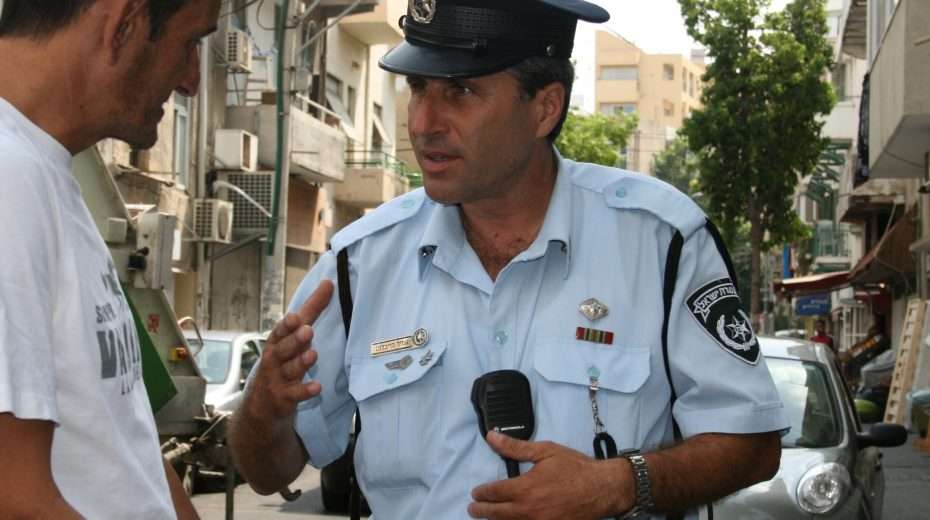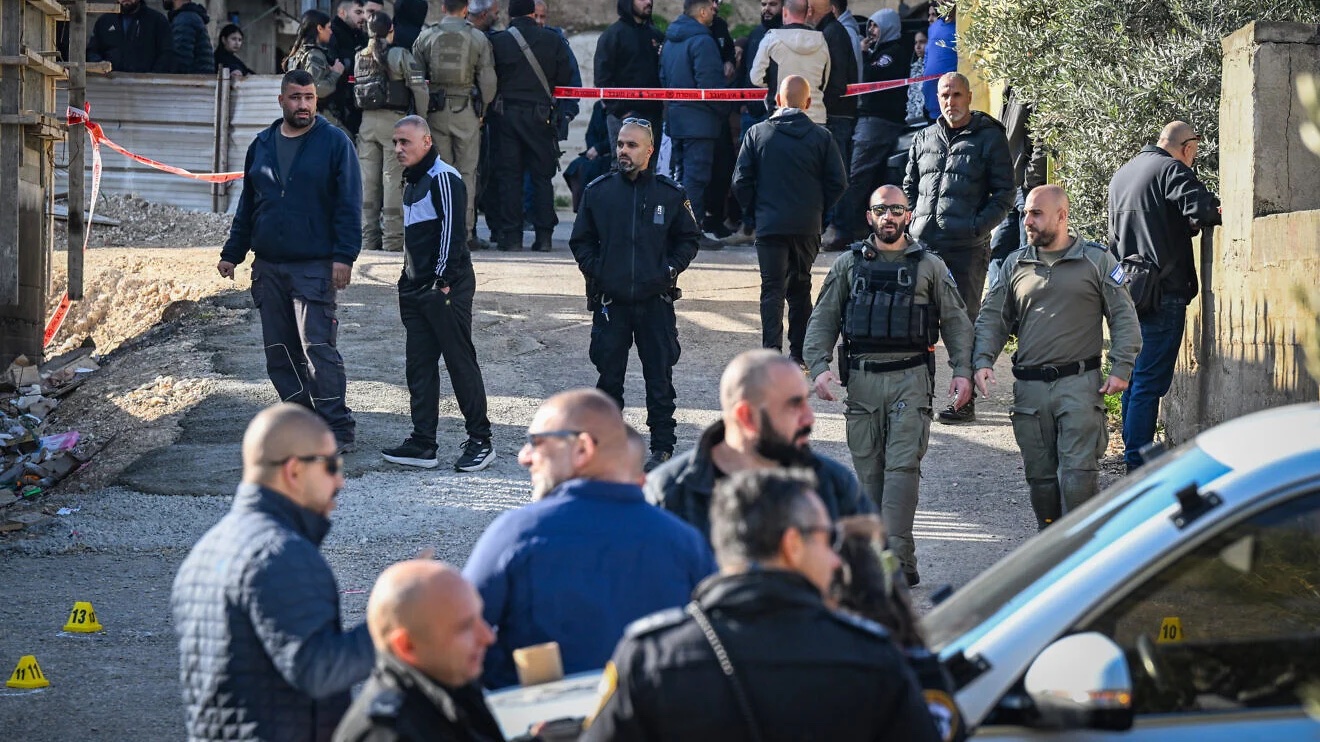Israeli policemen have plenty to do hunting down terrorists, breaking up drug rings and investigating politicians. But who can help recover a stolen bicycle, find a snatched handbag or get a car moved that’s blocking your driveway?
Well, there is a new cop in town, and he’s your neighborhood sheriff. It’s part of a program called “community policing” that’s reducing crime in Israel’s neighborhoods.
The first community police station opened in Ashkelon in 1997 after the National Police Department examined the successes of neighborhood law enforcement in Europe and the US. The program in Ashkelon proved so successful that there are now 360 community police stations in city neighborhoods, towns and villages across the country, though many residents, especially in large cities, don’t even know they exist.
In large urban centers like Tel Aviv the plan organizes the city into quarters and neighborhoods where all police work in that area is being coordinated with fire departments, Magen David ambulances, hospital emergency rooms and other municipality public services.
The heart and soul of the program is the local community police officer or “sheriff.” Unlike the image of Israeli policemen typically known for writing speeding tickets, chasing thieves or busting drug lords, the community sheriff spends most of his time walking his beat around the neighborhood getting to know the people.

Sheriff Komedi on the beat in south Tel Aviv. Photo: David Lazarus
Advanced Staff Sergeant David Komedi, a sheriff in Jaffa, begins his day at the local coffee shop around the corner from his station. He chats with the local businessmen about the summer heat and the national water crisis. They tell him about the increase of tourists in the area, or complain about the government cuts in education and the expected school strikes next week. Someone points to a pothole in the street that’s slowing traffic and says that the new apartment building going up in the neighborhood is only going to cause more congestion.
The sheriff learns about the garbage piling up behind the building site because the municipal trucks can’t get to it. He hears about an abandoned motor scooter left on the sidewalk blocking pedestrians. “This is my neighborhood, it’s my home,” Sergeant Komedi told Israel Today. “I‘m here to know my neighbors and understand their problems.”
On his beat Komedi notices a leaky water pipe dripping onto the sidewalk in front of the corner fruit stand. The shop owner explains that he’s called the municipality every day for two weeks, but no one comes to fix it. The sergeant calls his friend at city hall and within a few hours someone shows up to fix the leaky pipe. “Sometimes I can get things done just because I’m a policeman,” says Komedi. “People appreciate that.”
People in the neighborhood like to talk to the sheriff. They see that he cares about their community. Amir Hiblum, community cop for the Florentine quarter in Tel Aviv, attends local meetings with pensioners, boy and girl scouts and parent–teacher organizations to listen to what the neighbors are saying. In a recent meeting with the neighborhood’s residents committee, they told him about one particular street that was experiencing a lot of break-ins. Hiblum got the municipality to put up new lighting along the street and recommended that residents install video surveillance cameras. “The cameras helped,” says Hiblum, “but I have eyes on every street and in every corner of the neighborhood,” he explains, describing the residents who are looking out for each other and reporting back to him any suspicious activities.
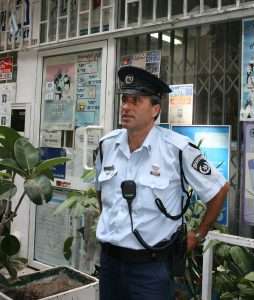
Sheriff Hiblum at his station. Photo: David Lazarus
Further up the street on his beat, Hiblum notices a moving company truck parked on the sidewalk. Greeting the sheriff with a smile and a handshake the owner talks about the parking problems and how small moving businesses are suffering because there’s no place to park their trucks. Hiblum says that it may even get worse as more and more business comes to the popular Florentine area, and he reminds the driver to make sure that his truck doesn’t block traffic, or pedestrians. Patting the sheriff on the back, the driver assures him that he won’t.
Community sheriffs don’t like passing out fines. “I’d rather talk to the people about how we can make life better in our neighborhood,” says Sheriff Hiblum. “The people who live here and have businesses understand that they need to obey the laws,” he says. “So first we talk about the problems and see what we can do. Of course sometimes I need to write a ticket or give a fine,” he adds. “Otherwise no one would listen to me.”
Former Police Commander Raphael Geda, head of the Department of Community Policemen for Tel Aviv, is proud of his 40 local sheriffs working the city’s streets. “A community policeman needs to know his neighborhood,” says Geda. “He has to know the people, where the problem areas are and what is happening on a day to day basis. We look for policemen who are highly motivated for this job,” he says. “We look for that fire in their eyes that says they really want to make a difference.”
“A lot of people don’t trust the police anymore,” notes Geda. “Nowadays, when people see a policeman coming they think he wants to write a ticket, give a fine or cause some trouble. These community cops are helping change the image of policemen in their neighborhoods,” Geda believes. “People are learning to trust us again.”
“It definitely gives us a feeling of security having a sheriff in the neighborhood,” says Judith Barbie, owner of a mini-market in Florentine. “We have a special relationship with Amir, it’s not like any other policeman.”
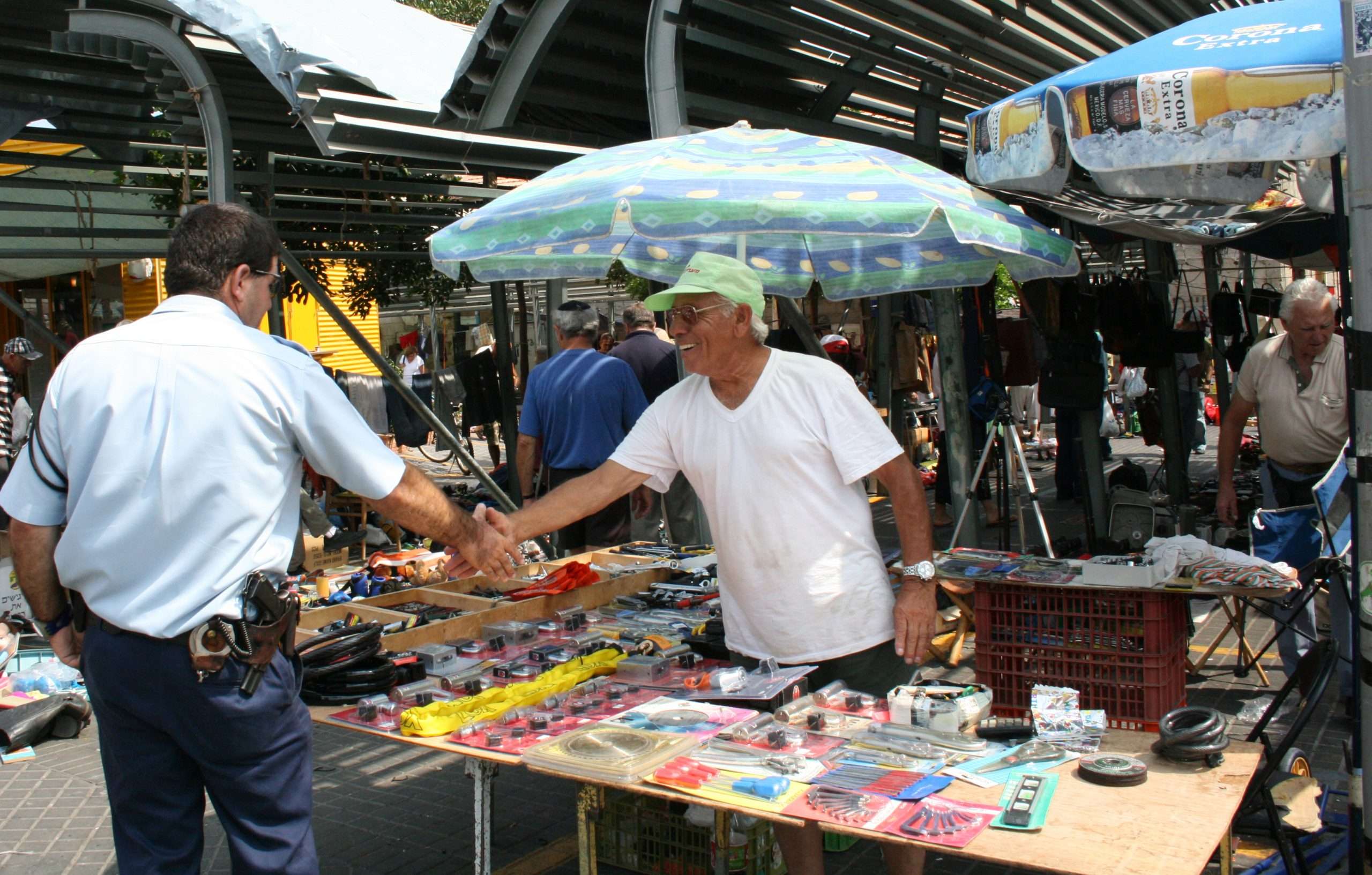
Sheriff Komedi talks to kids in the local high school once a week about drug abuse, road safety, violence and crime prevention. He’s building trust with these kids, and it pays off. At the Nachman Goldman School in south Tel Aviv, Komedi met Hasan, a 15-year-old that was always getting into trouble. “The kid needed some positive feedback from a supportive community so that he could improve himself,” says Komedi. “So we set up a system for Hasan where he was graded for his school work, but also for his behavior in the neighborhood. He still got into trouble a few times,” explains the sheriff, “but instead of opening a criminal record against him, I marked it in the notebook. Believe me, he was very concerned about that notebook!” Hasan graduated the school and now works as a car mechanic in the neighborhood.
Getting the community involved is the secret to the success of the program. There are over 6,000 community-based volunteers working with the policemen in their neighborhoods around the country. Sheriff Amir boasts 92 volunteer citizen police in his Florentine neighborhood. “I got involved,” says Ben-Natan David, a volunteer at the local station, “because some years ago I was attacked by a guy with a knife. I want to live in a neighborhood that’s secure and a place where I can enjoy my life,” he says.
A sheriff’s volunteers range in age from 18 to 65, men and women, and even teenagers can volunteer as part of their “civic accountability” training for high school. Volunteers drive patrol cars around the neighborhood, set up security roadblocks, answer the telephones and can assist in arrests when necessary. They even get a free lunch with all the regular police at the regional district headquarters.
In 2006, Sergeant Hiblum began a special program recruiting volunteers from the Beit Helen Keller Center in Tel Aviv. Today he has 30 deaf men and women integrated into the community policing project. “I tell them that we need them here just like anybody else,” says Hiblum. “We need to appreciate these people and involve them in every aspect of life in the neighborhood.”
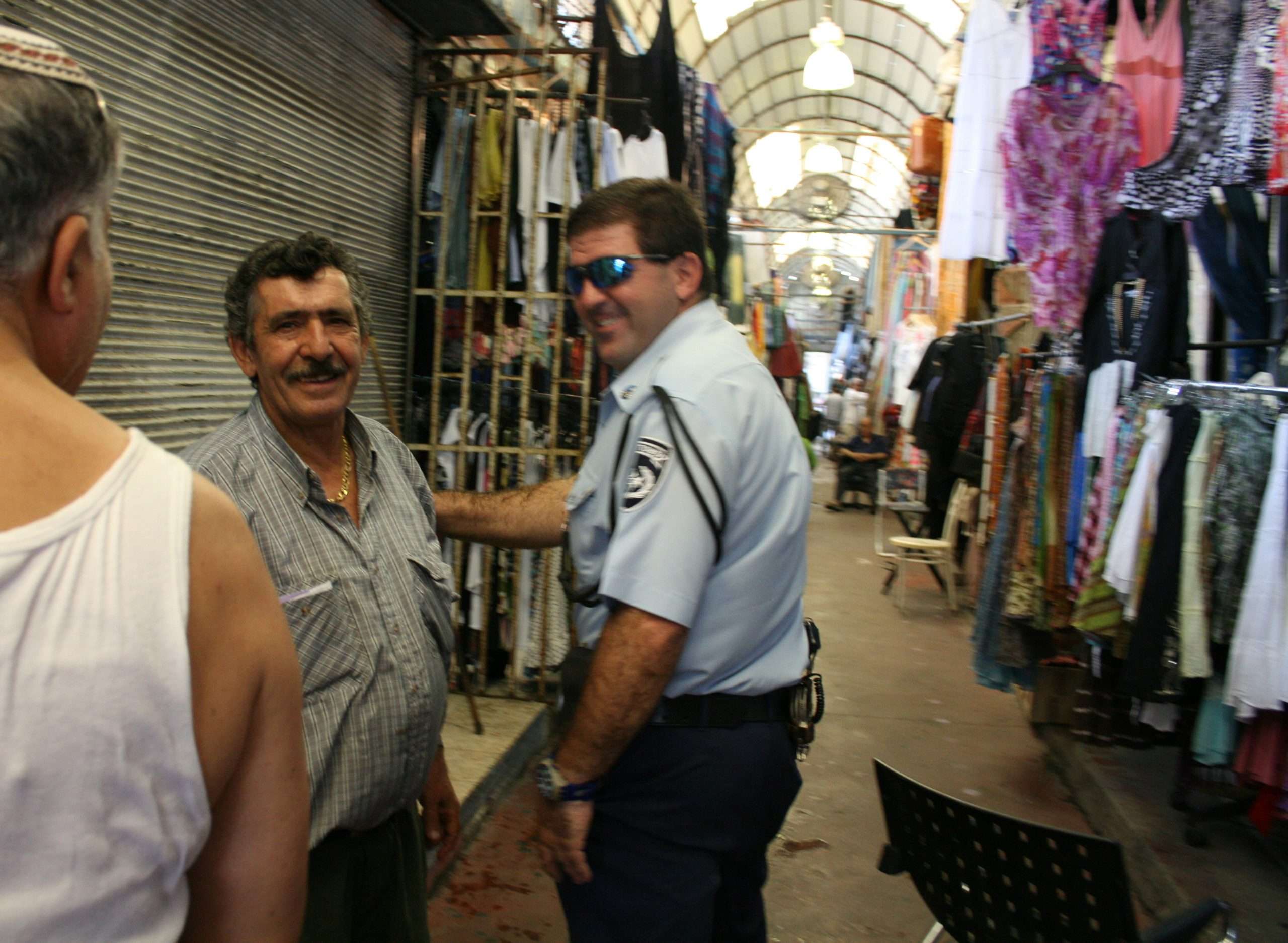
David Shmuel from Holon was a Border Police soldier, but when he wanted to sign up for an army career, his parents opposed it. Instead, he volunteered for Sergeant Komedi’s community police station for six years. Because of his military background Shmuel wears a police uniform on the job and can help in other ways. “One time a neighbor called to report shouting in the building next door,” says Shmuel. “We ran over and caught this guy that was about to kill his wife,” he recalls. “We saved her life.” Another time, Shmuel caught and arrested a terrorist that was running through the neighborhood with a knife in his hand. “I love helping out and protecting the neighborhood,” he says.
With so many soldiers in Israel there could be a lot more volunteers, but local community stations can’t get money to support the volunteers who need training and supervision. According to Sergeant Komedi, the bad reputation that police have in Israel also contributes to the problem. Police department budgets are being cut, and people don’t want to support a police system that they don’t see working.
Sometimes old-fashioned community concern together with modern technology combine to solve problems. Like all community cops, Sheriff Komedi gets an inbox of e-mails every day from the national department of police intelligence with information on criminal activities from around the country. He happened to notice a picture of a bronze statue that had been recovered in a police raid in Hebron that looked like one he had been admiring in a shop on his beat. Walking over to the antique shop with a picture of the statue, the owner confirmed that it had been stolen and Komedi was able to return it to its rightful owner.
“My goal is to get every citizen in the neighborhood contributing to the quality of life here,” says Sergeant Hiblum of the Florentine neighborhood. “Slowly but surely people are beginning to understand that we are all going to benefit when we cooperate.”


